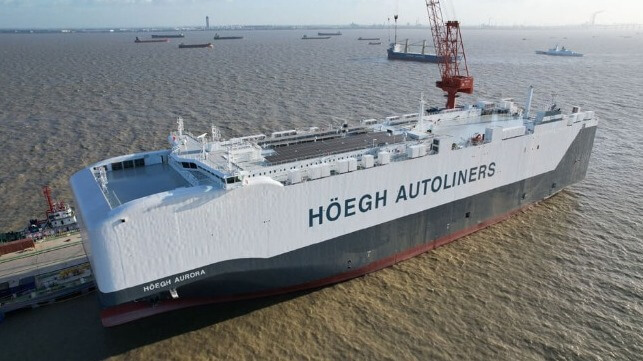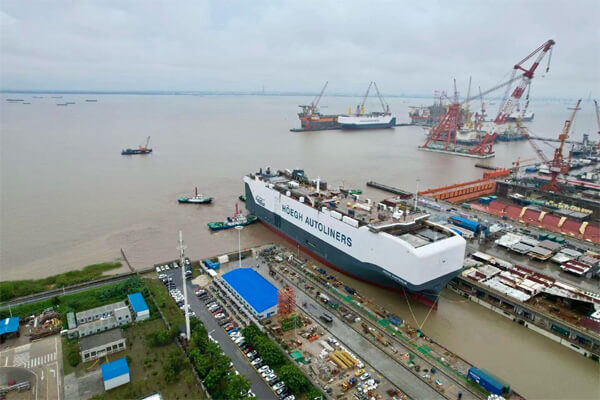Largest and Greenest Car Carrier Delivery to Hoegh

Höegh Autoliners celebrated the naming of the largest car carrier which it is also hails as the most environmentally friendly PCTC ever built. The company has a dozen of the Aurora Class multi-fuel vessels on order from China as part of its drive toward decarbonization.
The new Höegh Aurora is massive with a capacity of 9,100 units. The vessel is 25,200 dwt with a length overall of 656 feet (199.9 meters). The company highlights a broad range of innovations, including strengthened decks and an enhanced internal ramp system so that the vessel can carry electric vehicles on all 14 decks.
The class has moved rapidly the company says from design to the first unit being launched in under four years. Höegh has already ordered 12 vessels, including EU funding for the last four to be built for ammonia-fueled propulsion, and the company has options for four more vessels. The entire class is being launched with notations from DNV both for “ammonia ready” and for “methanol ready.”
“With the Aurora Class, we are pioneering efforts to combat pollution in a hard-to-abate segment,” says Andreas Enger, CEO of Höegh Autoliners. “We are setting new standards for sustainable deep-sea transportation, making a significant stride toward our 2040 net zero emissions goal.”
The first vessel of the class, Höegh Aurora, was named and christened today at the China Merchants Heavy Industry yard in Jiangsu, China, where two other members of the class have also already been launched. The first vessel will go into service immediately the company reports and they expect delivery of two vessels every six months until the first half of 2027.

The third vessel of the class was floated out a few weeks ago with three more building in dry docks at the yard (Höegh Autoliners)
The first Aurora Class vessels will be running on LNG, biofuel, and low-sulfur oil. They are employing 2-stroke main engines from MAN which will give them the ability to transition to emerging fuel options. They are also being outfitted to use shore power and 1,500 square meters of solar panels on the top deck which will reduce electricity production requirements from the generators by 30 to 35 percent.
Höegh’s goal with the vessels is to transition to ammonia by 2027. The company reports it will be able to reduce carbon emissions per car transported by up to 58 percent from the current industry average.
The company has committed to powering at least five percent of its deep-sea operations with green ammonia by 2030. The goal is to run its fleet on at least 100,000 metric tons of green ammonia by that same year.

that matters most
Get the latest maritime news delivered to your inbox daily.
They highlight that a broad partnership was involved in developing these unique vessels. The bridge system was supplied by Kongsberg Maritime, while DNV, DeltaMarin, MAN Energy Systems, MacGregor, TGE Marine, Bank of Communications, HD Hyundai, Glamox, and others also participated in the program.
The introduction of the new vessels comes as the sector rushes to introduce more ships to meet demand. Major companies including CMA CGM and now MSC Mediterranean Shipping have entered the sector for the first time while Chinese car manufacturers have launched their own ships. However, the EU’s efforts to impose massive tariffs on the Chinese EVs could have a major impact on demand.
